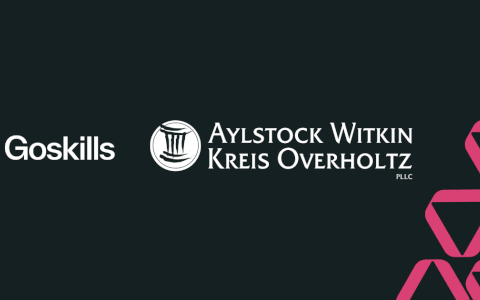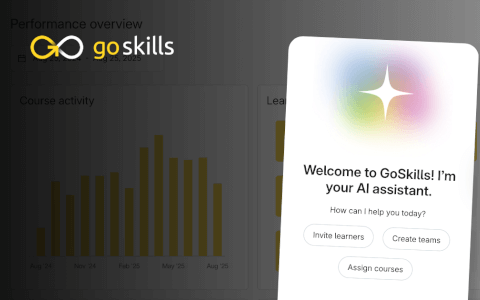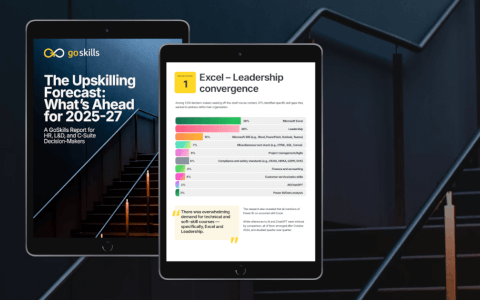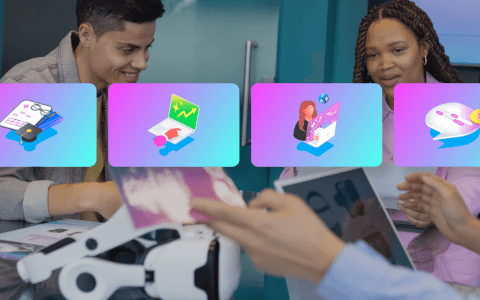Resources

10 min
9 Best Microlearning LMS Solutions for Employee Training
Learn how a microlearning LMS transforms workplace training with bite-sized lessons that boost engagement, retention, and efficiency.

3 min
Excel Challenge 61: Using Conditional Logic for Employee Vacation
This exercise challenges you to write conditional formulas in Excel using a combination of conditions. The scenario is fun — employees' annual fami...

6 min
Ethical AI: Best Practices for Elearning
Ethical AI in elearning is about enhancing learning without compromising trust or equity. Learn the six key principles to support trustworthy learn...

8 min
How AWKO Used the GoSkills LMS for Employee Onboarding and Achieved 95% Course Completion
See how law firm AWKO used the GoSkills LMS for employee onboarding to hit 95% course completion and build scalable training.

9 min
The Complete GoSkills Excel Challenges List
Browse 55+ free Excel challenges from GoSkills. Tackle real-world scenarios by skill, topic, or date — it’s totally up to you!

9 min
Free Excel Practice Exercises: Our 60th Challenge Milestone
Sharpen your spreadsheet skills with 15 free Excel practice exercises. Celebrate Excel Challenge #60 with fun, hands-on learning!

5 min
GoSkills Secures Gold Excellence Awards From the Brandon Hall Group
GoSkills wins two Gold Brandon Hall Awards for its AI-enabled Learning Management System (LMS). With GoSkills, teams can launch training faster and...

3 min
Excel Challenge 59: Consolidate Data From Multiple Sheets
Learn how to consolidate data from multiple sheets in Excel with this challenge. Use formulas only to build a dynamic multi-sheet summary report.

3 min
Excel Challenge 58: Customer Segmentation Using One Formula!
Create a customer segmentation report in Excel with one formula. Use dynamic arrays to group customers and label them Gold, Silver, or Bronze.

2 min
A New Look for GoSkills
Today, we’re excited to introduce the new GoSkills brand, a fresh identity that reflects how far we’ve come and the exciting direction ahead.

3 min
Excel Challenge 57: Consolidate Data from Multiple Files
Consolidating data in Excel from multiple workbooks? Learn how in this scenario-based challenge! Join our group of learners for Excel practice ever...

3 min
Excel Challenge 56 (Beginner-Friendly): Conditional Functions
Practice conditional formulas in Excel in a real-world scenario with this beginner-friendly challenge from Microsoft MVP Ilgar Zarbaliyev.

11 min
Free Instructional Design Courses & Resources For Beginners
Are you a new instructional designer looking for free tools and resources? Here are the top free courses to help you succeed in your role.

2 min
Introducing the AI Assistant for GoSkills LMS Administrators
Simplify LMS administration with the GoSkills AI Assistant, offering step-by-step task guidance, tailored support, and real-time answers.

3 min
GoSkills Releases “The Upskilling Forecast: What’s Ahead for 2025–27,” Detailing Three Megatrends Set to Redefine Corporate Learning
GoSkills shares the results of an extensive 3-year analysis of corporate upskilling trends and makes bold predictions for the next two years.

2 min
Excel Challenge 55: Analyze Sales With SUMIF & SUMIFS
Learn how to use conditional formulas SUMIF and SUMIFS in Excel to analyze sales performance in this fun Excel challenge.

17 min
Gamified LMS for Employee Training: Risks and Rewards
Discover how a gamified LMS boosts training, but beware of over-gamification risks. Balance is key for real engagement and learning outcomes.

9 min
AI Employee Training: How Online Courses Can Maximize Productivity
AI employee training increases productivity 14-40% per MIT & Harvard studies. GoSkills offers comprehensive courses to unlock these gains for your ...

12 min
AI Courses for Beginners: A New Frontier of Business Training
Explore top AI courses for beginners. Help employees learn foundational AI literacy, boost productivity, and stay competitive in the evolving AI la...

3 min
Excel Challenge 54: Clean Up Messy Data With Power Query
Use Power Query to transform messy, unmanageable data into analysis-ready insights with this month's Excel challenge from GoSkills.